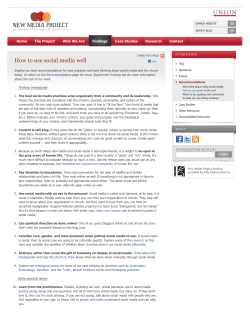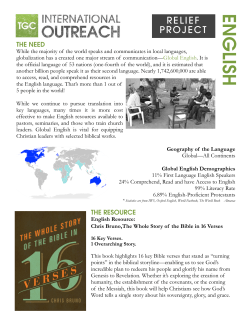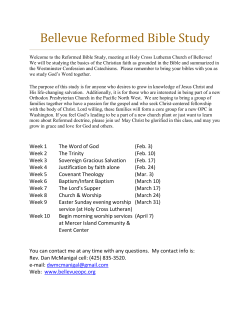
Advanced Biblical Exegesis - Reformed Theological Seminary
RTS D I S TA N C E E D U C AT I O N Advanced Biblical Exegesis 0ON504, 3 Credit Hours Lectures by Robert J. Cara, Ph.D. and Richard P. Belcher, Jr., Ph.D RTS Distance Education This course notebook is for the coordination of your course materials, including reading assignments and lecture recordings. Each course notebook for RTS Distance Education is arranged by the GUIDE acronym. The five components of GUIDE are organized in each lesson by the following steps in the notebook: GUIDE Getting Started To do the lessons, reading and listening assignments are listed. Understanding To maximize learning, the purposes are given. Investigating To explore the content, outlines are provided for note taking. Developing To expand content, readings are suggested. Evaluating To help review, lesson questions are based on purposes. ii Advanced Biblical Exegesis - Dr. Robert J. Cara and Dr. Richard P. Belcher, Jr. © 2013 - Reformed Theological Seminary, Distance Education COURSE SYLLABUS Advanced Biblical Exegesis, 0ON504, 3 hours Lecturing Professors: Dr. Robert J. Cara and Dr. Richard P. Belcher, Jr. Professor of Record: Dr. Richard P. Blecher, Jr. Reformed Theological Seminary, Distance Education Lecturing Professor Dr. Robert J. Cara is Professor of New Testament at RTS-Charlotte and Chief Academic Officer for the RTS institution. Dr. Cara was an engineer for seven years before the Lord re-directed him toward seminary. In addition to the traditional New Testament topics, Dr. Cara’s academic interests include relating the New Testament to Reformed Theology, creeds, hermeneutics, creation, and narrative criticism. His commentary on 1 & 2 Thessalonians was recently published with Evangelical Press. As an ordained minister in the ARP Church, Dr. Cara has been very involved at both the presbytery and synod levels. He is a former vice-moderator of the denomination and for several years was the chairman of the denominational Inter-Church Relations Committee. He preaches regularly in the Charlotte area. Lecturing Professor and Professor of Record Dr. Belcher is the Professor of Old Testament and Academic Dean of RTS Charlotte. He is an ordained minister in the PCA and pastored an urban nondenominational church in Rochester, NY for ten years before pursuing the Ph. D. This pastoral experience in an unusual and challenging setting gives him great insight into the practical, modern issues that will be faced by future pastors studying with him at RTS. He graduated from Covenant College and received his M. Div from Covenant Seminary. He also received an S.T.M. from Concordia Theological Seminary, and his Ph. D. is from Westminster Theological Seminary. He has served as stated supply for numerous churches in the area since coming to RTS Charlotte in 1995. Course Description Emphasis will be placed upon OT-NT issues, particularly redemptive-historical considerations and covenant theology. Background hermeneutical issues will be covered, including the role of the interpreter and creeds/confessions. In addition, the course will include a brief overview of the history of interpretation of the Bible from the early church to modern day. Finally, the class will explore the relationship between original meaning and modern meaning. This course is team taught with the first half of the course being taught by Dr. Cara and the second half of the course being taught by Dr. Belcher. The final lecture includes a guest lecture from Dr. Michael J. Kruger. iii Advanced Biblical Exegesis - Dr. Robert J. Cara and Dr. Richard P. Belcher, Jr. © 2013 - Reformed Theological Seminary, Distance Education Course Objectives The overarching purpose is for the student to interact with a variety of macrohermeneutical issues, including Reformed models, to enable the student to better interpret/ apply the Bible. Course objectives as coordinated with MDiv Student Learning Outcomes are shown at the end of this document. Required Textbooks Beale, Greg K. Handbook on the New Testament Use of the Old Testament. Grand Rapids: Baker, 2012. Greidanus, Sidney. Preaching Christ from the Old Testament. Grand Rapids: Eerdmans, 1999. Pratt, Richard L. He Gave Us Stories. Phillipsburg: P&R, 1990. Silva, Moises, ed. Foundations of Contemporary Interpretation. Grand Rapids: Zondervan, 1996. Swain, Scott R. Trinity, Revelation, and Reading. New York: T&T Clark, 2011. All required books are available through the RTS Online Bookstore at www.mindandheart.com. iv Advanced Biblical Exegesis - Dr. Robert J. Cara and Dr. Richard P. Belcher, Jr. © 2013 - Reformed Theological Seminary, Distance Education COURSE REQUIREMENTS Advanced Biblical Exegesis, 0ON504, 3 hours Lecturing Professors: Dr. Robert J. Cara and Dr. Richard P. Belcher, Jr. Professor of Record: Dr. Richard P. Blecher, Jr. Reformed Theological Seminary, Distance Education Online Student Handbook The Online Student Handbook has been designed to assist you in successfully navigating the Distance Education experience, whether you are taking a single course or pursuing a certificate or degree program. In it you will find valuable information, step-by-step instructions, study helps, and essential forms to guide you through every aspect of your distance education opportunity from registration to graduation. Please use this resource as your first-stop reference manual. You will find it located at the RTS Distance Education website (www.rts.edu/distance) under the Student Services tab. Summary of Requirements • Listen to all Recorded Lectures • Complete all Readings • Participate in Forum Discussions (with other students and Professor) • Take the Final Exam • Submit Reading Report • Submit Two Papers • Submit Mentor Report/Course Application Paper Forum Discussions (15%) The student is required to interact in two (2) forums: 1. Student-Professor Posts (15 total posts) A. Personal Introduction Forum: The student is required to post a brief personal introduction to the professor/class. Suggested details include your vocation, where you live, your church background, why you chose RTS, and what you hope to gain through the course (1 required post). B. 5 Topical Discussion Q&A Forums: The student is required to answer each topical discussion question with one (1) response. The professor will acknowledge the student’s answer and will follow up with a subsequent question to which the student must also answer with one (1) response. Each topical discussion question therefore requires two (2) total posts/responses from the student (Total of 5 forums x 2 posts =10 total posts). C. Student-Professor Forum: The student is required to post four (4) times in this forum. Posts in this forum should focus on course-related content such as research paper topics, lectures and reading assignments, or other academic issues related to the course. 2. Student-Student Forum (5 total posts) • A post may be either a new topic or a response to an already existing topic. Examinations (Final 30%) There will be 1 examination for this course. No helps, including Bibles, are allowed. The student should use the Lesson Questions to guide them in their preparation and study for the v Advanced Biblical Exegesis - Dr. Robert J. Cara and Dr. Richard P. Belcher, Jr. © 2013 - Reformed Theological Seminary, Distance Education exam. The exam will consist of short answer (from 1 sentence to 2 paragraphs) and objective (multiple-choice, T/F, etc.) questions. The exam for this course is to be taken online in the Learning Management System (LMS). Please note that you will need to have a proctor for your exams. Your proctor can be anyone except a relative or current RTS Student. After clicking on the exam link, you will be given detailed instructions about the exam. Please read these instructions carefully before entering the exam. Reading Report (10%) Each student must complete all of the required reading in the Beale, Greidanus, and Swain books. Reading assignments are broken down week by week in the modules of the LMS. Please click on “Submit Assignment” and provide the following information: • Your Name • Percentage of Required Reading you have completed • Your course end date Papers (40%) Paper #1 (20%): Pratt’s He Gave Us Stories, pages 1-128, 306-402. • Submit a 7-10 page paper, with no or few footnotes, that includes: oo A statement that student read 100% of Pratt reading requirement. oo A self-conscious evaluation of one or more aspects of the student’s interaction within his covenant community (both heritage and present) that has (or will have) influenced the student’s biblical interpretation (BT/R-H/ST). This influence can be either positive, negative, or both. oo The paper should show knowledge of your covenantal community, and categories in Pratt’s book and Cara’s lectures. oo Although no research is required, this paper should have a sophisticated understanding of macro-hermeneutics and indicate that the student can “theologize” about himself relative to his theological community. oo Paper due at the conclusion of Cara’s portion of the lectures (week 6). Paper #2 (20%): Silva, M., ed. Foundations of Contemporary Interpretation. • Read any one of the books in this volume, except God, Language and Scripture. • Submit a 7-10 page paper, with few or no footnotes, that includes: oo A statement that student read 100% of book within the volume. oo A summary of the book (1/3 of paper). oo Critique one small or large section in the book (2/3 of paper). The critique should show knowledge of Cara/Belcher lectures and the ability of the student to theologize about hermeneutics. oo Paper due at the end of the course. Mentor Report/Course Application Paper (5%) Each Global/Non-Residential student is required to have a mentor submit a report at the end of the course. This report will contribute to 5% of the student’s grade. For students who are not Global/Non-Residential, you are asked to write a 200 word summary of how you perceive what you have learned in this course will fit into the objectives you have for your ministry, your educational goals, or other objectives you wish to achieve in life. Assignments vi Advanced Biblical Exegesis - Dr. Robert J. Cara and Dr. Richard P. Belcher, Jr. © 2013 - Reformed Theological Seminary, Distance Education Best practice for your time management is for you to submit all assignments at the end of the week in which they fall, using the upload links provided in the LMS (Learning Management System). All work must be submitted by midnight of the course end date, per your course start letter. You are responsible for turning in all assignments on time; no late submissions are permitted. Any student who needs an extension must get approval from the Registrar prior to that time. Grading Scale The Seminary’s published grading scale, is as follows: A 100-97 A96-94 B+ 93-91 B 90-88 B87-86 C+ 85-83 C 82-80 C79-78 D+ 77-75 D 74-72 D71-70 F 69 and below Contact Information Reformed Theological Seminary, Distance Education 2101 Carmel Road Charlotte, NC 28226 (704) 900-1257 1-855-854-6920 FAX: (704) 366-9295 E-mail: dess@rts.edu Web site: www.rts.edu/distance vii Advanced Biblical Exegesis - Dr. Robert J. Cara and Dr. Richard P. Belcher, Jr. © 2013 - Reformed Theological Seminary, Distance Education COURSE OUTLINE Advanced Biblical Exegesis, 0ON504, 3 hours Lecturing Professors: Dr. Robert J. Cara and Dr. Richard P. Belcher, Jr. Professor of Record: Dr. Richard P. Blecher, Jr. Reformed Theological Seminary, Distance Education Lesson One Hermeneutics and Revelation Lesson Two Macro-Hermeneutics and Heritage Covenant Community Influence Lesson Three Present Covenant Community Influence and Meaning Lesson Four Hermeneutical Methodologies and Sermons Lesson Five Modern Audience - Meaning and Adjustments Lesson Six Hermeneutical Proverbs Lesson Seven History of Exegesis and Allegorical Exegesis Lesson Eight Antiochene Exegesis and Exegesis in the Middle Ages Lesson Nine Reformation Exegesis and Enlightenment Exegesis Lesson Ten Jewish Exegesis and New Testament Exegesis Lesson Eleven Preaching Christ From the Old Testament Lesson Twelve Covenant Theology viii Advanced Biblical Exegesis - Dr. Robert J. Cara and Dr. Richard P. Belcher, Jr. © 2013 - Reformed Theological Seminary, Distance Education REFORMED THEOLOGICAL SEMINARY SYSTEM Course Objectives Related to MDiv Student Learning Outcomes With Mini-Justification Course: ABX/Macro-Hermeneutics Professor: Robert J. Cara and Richard P. Belcher MDiv Student Learning Outcomes Articulation (oral & written) Scripture Reformed Theology Sanctification Desire for Worldview Broadly understands and articulates knowledge, both oral and written, of essential biblical, theological, historical, and cultural/global information, including details, concepts, and frameworks. Significant knowledge of the original meaning of Scripture. Also, the concepts for and skill to research further into the original meaning of Scripture and to apply Scripture to a variety of modern circumstances. (Includes appropriate use of original languages and hermeneutics; and integrates theological, historical, and cultural/global perspectives.) Moderate Moderate Significant knowledge of Reformed theology and practice, with emphasis on the Westminster Standards. Moderate Demonstrates a love for the Triune God that aids the student’s sanctification. Minimal Burning desire to conform all of life to the Word of God. Winsomely Reformed Embraces a winsomely Reformed ethos. (Includes an appropriate ecumenical spirit with other Christians, especially Evangelicals; a concern to present the Gospel in a Godhonoring manner to non-Christians; and a truth-in-love attitude in disagreements.) Preach Ability to preach and teach the meaning of Scripture to both heart and mind with clarity and enthusiasm. Worship Knowledgeable of historic and modern Christian-worship forms; and ability to construct and skill to lead a worship service. Shepherd Rubric Ability to shepherd the local congregation: aiding in spiritual maturity; promoting use of gifts and callings; and encouraging a concern for non-Christians, both in America and worldwide. Strong Strong Moderate 1. Submits one self-reflected hermeneutics paper. 2. Submits one critical book review. 3. Significant overview of the history of hermeneutics, both in the church and philosophy, is included. 1. Scriptures’ interpretation of Scripture is included. 2. Scriptures’ understanding of “meaning” is evaluated. 1. Overview of Reformed view of General and Special Revelation. 2. Reformed hermeneutics. 3. History of Reformed denominations. 1. Psalm singing in class 2. Self-reflection paper. 1. The Bible is the ultimately authority of hermeneutical questions. 2. Student’s background affects hermeneutics. 1. The ethos of RTS is presented and evaluated as to how that affects hermeneutics. 1. Section of hermeneutics of “modern meaning.” None Minimal Church/World Ability to interact within a denominational context, within the broader worldwide church, and with significant public issues. Mini-Justification Strong 1. Understand one’s own background is an aid to understanding others. 1. Overview of theological traditions (Reformed, Lutheran, RC, EO). 2. Creed discussions. 3. Philosophical hermeneutics. 4. Modernism vs Post-Modernism. ix Advanced Biblical Exegesis - Dr. Robert J. Cara and Dr. Richard P. Belcher, Jr. © 2013 - Reformed Theological Seminary, Distance Education
© Copyright 2025









